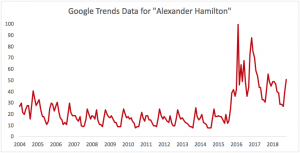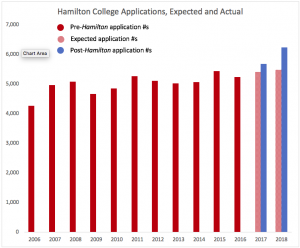
Stamats Insights
October 15, 2018

I’ll come right out and say it: I love Hamilton. To the amusement (and perhaps consternation) of those who know me, I’ve shared my opinion that Lin-Manuel Miranda’s Hamilton: An American Musical is the most perfect piece of art I have ever experienced. And if you’ve seen the show or listened to the music, you may agree.
Hamilton took the world by storm when it premiered in 2015, won 11 Tony Awards in 2016, and began a national tour last year. A hip-hop musical about a founding father was hardly the recipe for a runaway hit, but the fascinating story, extraordinary music, and incredible performances made it a success.
Part of the musical’s mission is to shine a light on a relatively obscure historical figure. Sure, we recognize Hamilton from the ten-dollar bill – and the musical undoubtedly played a role in keeping him on there – but there weren’t too many people who knew much about Alexander Hamilton, the man. Hamilton changed that by telling the founding father’s story and drawing attention to the things he accomplished in spite of his humble beginning.
What’s more, the show spurred people to learn more about him. Consider, for instance, Google search data for “Alexander Hamilton” between 2004 and 2018:

Suffice it to say that Hamilton would be proud to see his relevance in American culture today—more than 200 years after his death.
And so it occurred to me recently after chatting with a graduate of Hamilton College that the popularity of this musical and the interest in Alexander Hamilton also may extend benefits to the institution bearing his name.
Hamilton, the first secretary of the treasury, became a trustee of a seminary in upstate New York and consented to giving it his name. The Hamilton-Oneida Academy eventually became Hamilton College in 1812 and has become one of the highest-quality liberal arts colleges in the country (of this, too, Hamilton would be proud!).
In recent years, Hamilton College has wisely capitalized on the popularity of the musical. The College has purchased blocks of tickets to the show for fundraising events. Hamilton College’s former president, Joan Hinde Stewart, was known to rap some of the lyrics during speeches. And even before the show premiered, Lin-Manuel Miranda visited campus to celebrate the school’s 200th anniversary and performed the show’s opening number. Students have reported a special feeling of pride in the musical knowing they are part of an institution that carries on the legacy of one of America’s (now) most popular founding fathers.
But does the connection between Hamilton (the college), Hamilton (the man), and Hamilton (the musical) affect students’ interest in the school? The data would suggest it does!
I compiled application data for Hamilton College between 2006 and 2018 using a combination of IPEDS data and figures reported on the College’s website for 2017 and 2018 class profiles. Based on the show’s premier in 2015 and its booming popularity in 2016, the earliest we would realistically expect to see a change in applications would be 2017.
Based on that, I applied a linear trend to see how many applications we would have expected in 2017 and 2018 if trends from the previous ten years (2006-2016) had continued. The trend indicates that Hamilton should have received 5,413 applications in 2017 and 5,482 in 2018. In reality, however, Hamilton received 5,678 applications in 2017 and 6,240 in 2018—1,000+ more applications than would have been expected!

Now, we are, of course, careful not to confuse correlation with causation. And Hamilton College, being the outstanding institution that it is, has likely done a lot on its own to increase application volume in recent years. Nevertheless, the data tell a story all their own and indicate that Hamilton has played a role in driving applications to the College.
So what’s the takeaway? Is it that in order to increase applications it’s necessary to have a once-in-a-generation talent write a groundbreaking hip-hop musical with the same title as your institution? Certainly not (although it would be interesting to hear rhymes for Quinnipiac, Valparaiso, or Oberlin).
Rather, I see two lessons here.
The first is that when an opportunity comes along, seize it. Hamilton College was smart to embrace the musical and reinforce the connection between the founding father and the institution.
Second, your brand is partly built on who and what you align yourself with (or don’t align with). I hardly believe that Hamilton College would have gone out of its way to promote Hamilton if it had remained, as Miranda originally conceived of it, merely a rap album. But instead, the album became a musical—a musical inspired by an 800-page historical biography, a musical that starred a diverse cast, a musical that made people reflect on their own lives, and ultimately a musical that gripped the nation with its innovation and compelling storytelling. Those are brand elements that most colleges would be happy to associate with. Hamilton College was lucky enough to have the opportunity and smart enough to seize it. That choice, the data suggest, is paying off.
Ready to Get Started?
Reach out to us to talk about your strategy and goals.